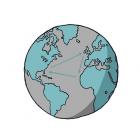In the eighteenth century, cheap raw materials from the Americas and other emerging markets drove European world trade. Since then, the world population has grown rapidly, and production and consumption has been rising exponentially. We live in a globalized world: streets, air travel, railroads, and shipping lines transport products and people across the world within short periods of time and at relatively low costs. In a planet dominated and irreversibly altered by human activity, the consequences—climate change, species extinction, monocultures, deforestation, exploitation of natural resources, and the spread of livestock—add up. We have outsourced production and waste disposal and thereby lost sight of our ecological footprint. The concept of the Anthropocene sets the stage for change: instead of exploiting the earth, humans should be its caretakers.

America Transatlantic Triangular Trade
Daniela David-Spickermann
America Transatlantic Triangular Trade
Daniela David-Spickermann
Drawn by Daniela David-Spickermann , 2014.
 This work is licensed under a Creative Commons Attribution-NonCommercial-NoDerivatives 4.0 International License.
This work is licensed under a Creative Commons Attribution-NonCommercial-NoDerivatives 4.0 International License.
America and the transatlantic triangular trade
Text and images by Daniela David-Spickermann
University of the Arts (UdK), Berlin
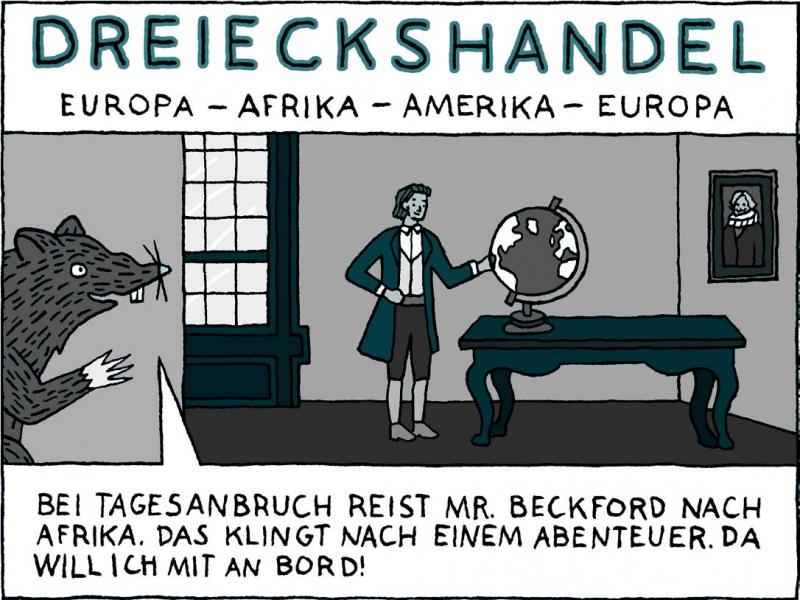
America and the Atlantic Triangular Trade
Europe – Africa – America – Europe
In the morning, Mr. Beckford will set sail for Africa. That sounds like an adventure. I want to come on board!
America and the Atlantic Triangular Trade
Europe – Africa – America – Europe
In the morning, Mr. Beckford will set sail for Africa. That sounds like an adventure. I want to come on board!
Drawn by Daniela David-Spickermann , 2014.  This work is licensed under a Creative Commons Attribution-NonCommercial-NoDerivatives 4.0 International License.
This work is licensed under a Creative Commons Attribution-NonCommercial-NoDerivatives 4.0 International License.

Loaded with guns, glass pearls, steel, and liquor, we set sail. What is he planning to do with this junk?
Loaded with guns, glass pearls, steel, and liquor, we set sail. What is he planning to do with this junk?
Drawn by Daniela David-Spickermann , 2014.  This work is licensed under a Creative Commons Attribution-NonCommercial-NoDerivatives 4.0 International License.
This work is licensed under a Creative Commons Attribution-NonCommercial-NoDerivatives 4.0 International License.
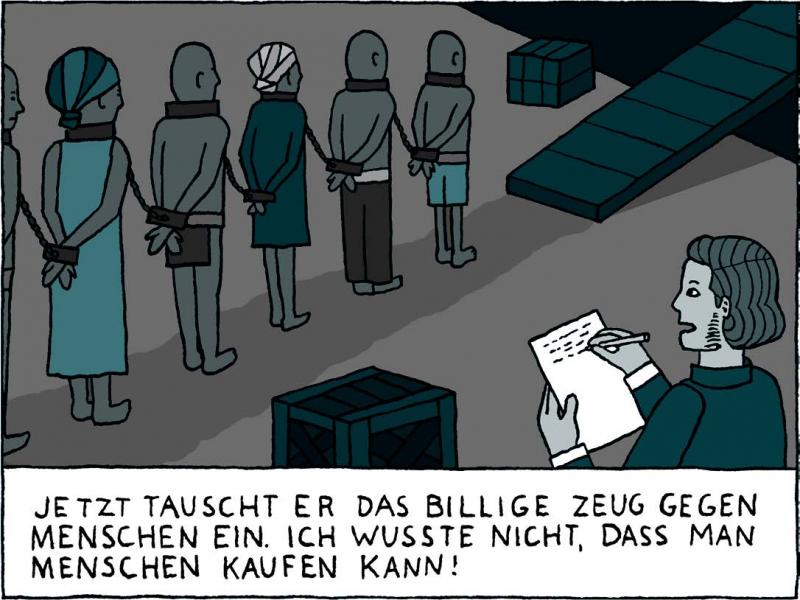
He is trading this junk for human beings. I didn’t know that you could buy humans!
He is trading this junk for human beings. I didn’t know that you could buy humans!
Drawn by Daniela David-Spickermann , 2014.  This work is licensed under a Creative Commons Attribution-NonCommercial-NoDerivatives 4.0 International License.
This work is licensed under a Creative Commons Attribution-NonCommercial-NoDerivatives 4.0 International License.
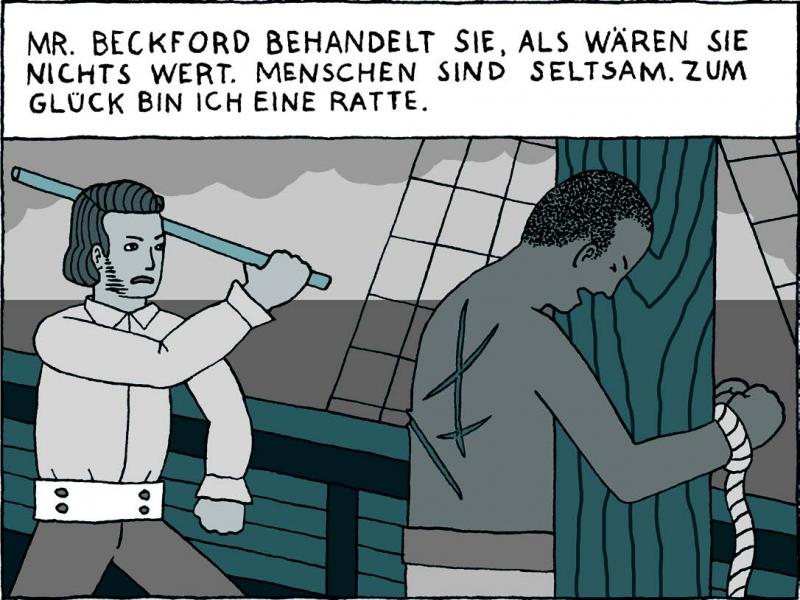
Mr. Beckford treats them as if they are worth nothing. Humans are strange. I’m lucky I’m a rat.
Mr. Beckford treats them as if they are worth nothing. Humans are strange. I’m lucky I’m a rat.
Drawn by Daniela David-Spickermann , 2014.  This work is licensed under a Creative Commons Attribution-NonCommercial-NoDerivatives 4.0 International License.
This work is licensed under a Creative Commons Attribution-NonCommercial-NoDerivatives 4.0 International License.
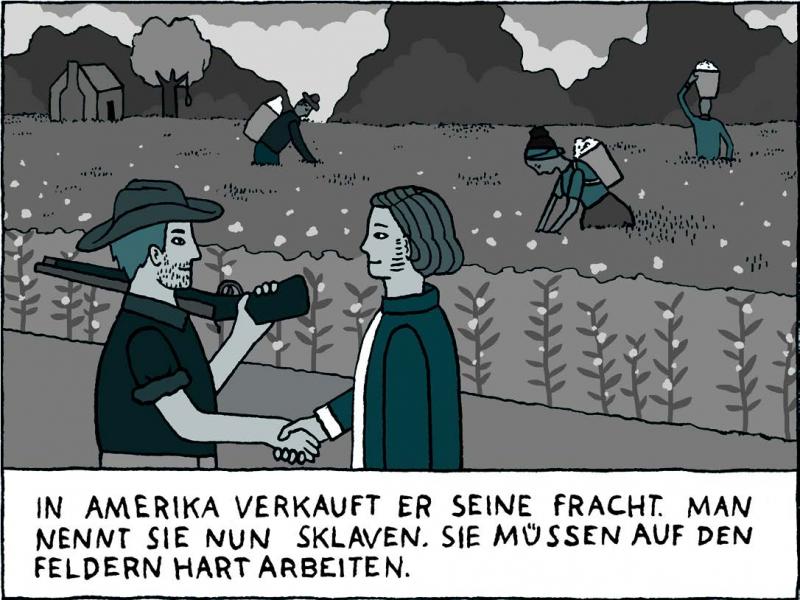
He sells his wares in America. They are called slaves now. They have to work hard in the fields.
He sells his wares in America. They are called slaves now. They have to work hard in the fields.
Drawn by Daniela David-Spickermann , 2014.  This work is licensed under a Creative Commons Attribution-NonCommercial-NoDerivatives 4.0 International License.
This work is licensed under a Creative Commons Attribution-NonCommercial-NoDerivatives 4.0 International License.
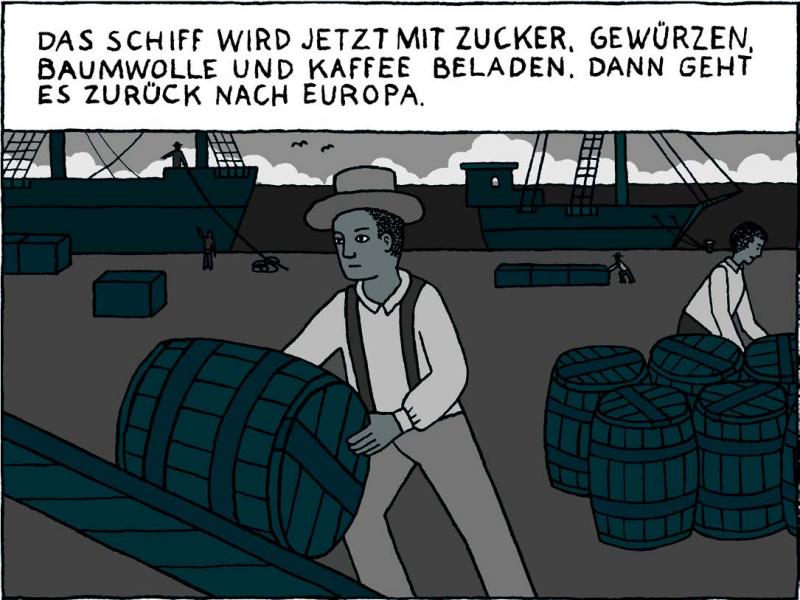
Now they are loading up the ship with sugar, spices, cotton, and coffee. Then it will head back to Europe.
Now they are loading up the ship with sugar, spices, cotton, and coffee. Then it will head back to Europe.
Drawn by Daniela David-Spickermann , 2014.  This work is licensed under a Creative Commons Attribution-NonCommercial-NoDerivatives 4.0 International License.
This work is licensed under a Creative Commons Attribution-NonCommercial-NoDerivatives 4.0 International License.
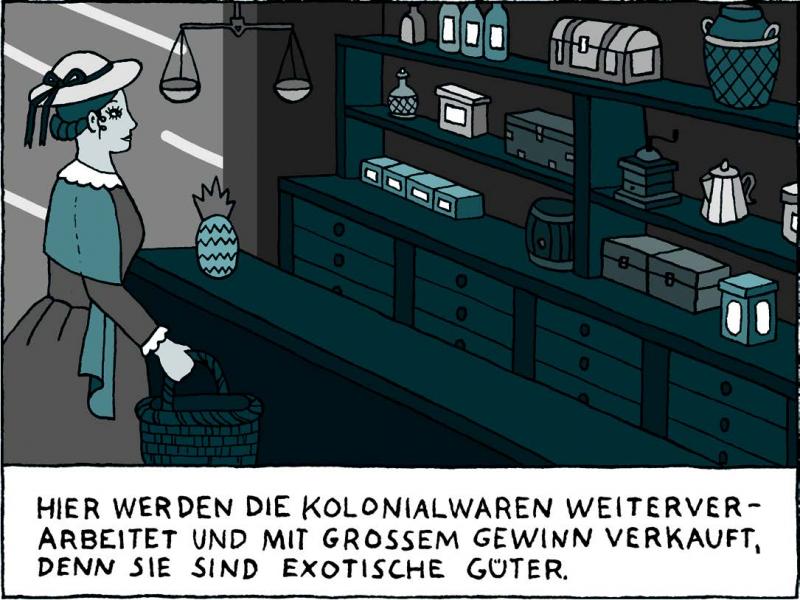
Here, the colonial goods are processed and sold for a major profit because they are exotic goods.
Here, the colonial goods are processed and sold for a major profit because they are exotic goods.
Drawn by Daniela David-Spickermann , 2014.  This work is licensed under a Creative Commons Attribution-NonCommercial-NoDerivatives 4.0 International License.
This work is licensed under a Creative Commons Attribution-NonCommercial-NoDerivatives 4.0 International License.
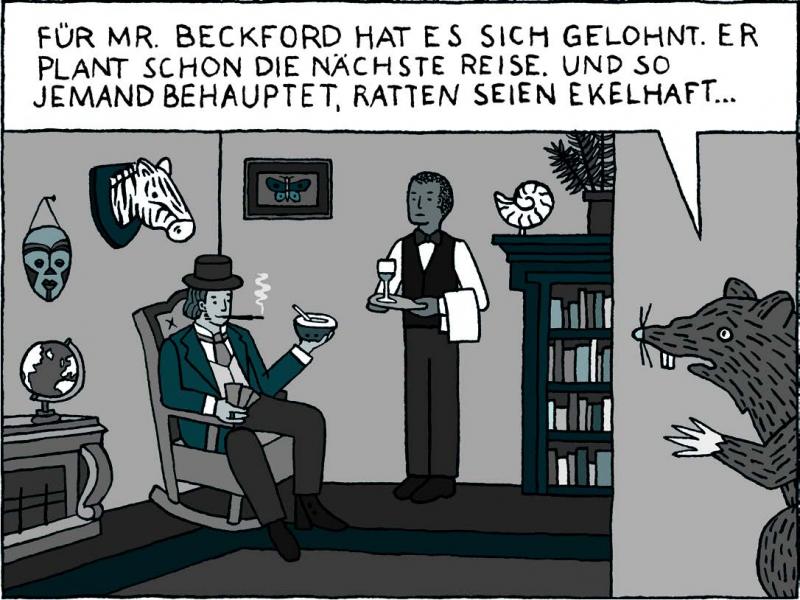
It paid off for Mr. Beckford. He is already planning his next journey.
And people like him think that rats are disgusting…
It paid off for Mr. Beckford. He is already planning his next journey.
And people like him think that rats are disgusting…
Drawn by Daniela David-Spickermann , 2014.  This work is licensed under a Creative Commons Attribution-NonCommercial-NoDerivatives 4.0 International License.
This work is licensed under a Creative Commons Attribution-NonCommercial-NoDerivatives 4.0 International License.
Artist’s comment
Dealing with the history of triangular trade gave me cause to think: our prosperity is based upon the exploitation and forced migration of so many people. What did these people think and feel? What did the plantation owners, traders, and ship owners think and feel? The latter probably only thought about their own profit—a plan that totally paid off, as history has shown.
How to cite
David-Spickermann, Daniela. “America and the Transatlantic Triangular Trade.” Environment & Society Portal, Multimedia Library, 2014. http://www.environmentandsociety.org/node/6650/.
The comic also appears in Alexandra Hamann, Reinhold Leinfelder, Helmuth Trischler, and Henning Wagenbreth, eds., Anthropozän – 30 Meilensteine auf dem Weg in ein neues Erdzeitalter. Eine Comic-Anthologie (Munich: Deutsches Museum, 2014).
This work is licensed under a Creative Commons Attribution-NonCommercial-NoDerivatives 4.0 International License.


